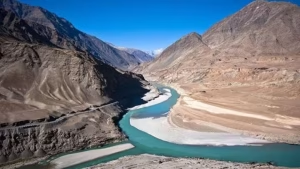
He emphasized that the 1960 water-sharing deal was broken by Pakistan.
According to Harish, the recent terrorist incident in Pahalgam was the final straw in a lengthy history of Pakistan-sponsored cross-border terrorism.
India Accuses Pakistan of Violating Indus Waters Treaty Spirit
Violation of Treaty Spirit and Terrorism Concerns
India has accused Pakistan of consistently violating the spirit of the Indus Waters Treaty, despite the agreement being in place for over six decades. Harish, a senior official, pointed out that Pakistan’s history of waging three wars and supporting thousands of terror attacks undermines the foundational trust of the treaty.
He emphasized that over 20,000 Indian lives have been lost due to terrorism in the past four decades, with these actions directly contradicting the treaty’s cooperative intent.
Harish also noted that climate change and demographic shifts have fundamentally altered the context in which the treaty was signed 65 years ago.
Infrastructure and Energy Needs
India’s growing energy demands and dam safety issues are also central to its concerns. Harish highlighted that while modern technology has improved dam safety, many older structures remain at risk.
He cited Pakistan’s repeated obstruction of critical infrastructure improvements, particularly referencing the terrorist attack on the Tulbul Navigation Project in 2012. According to Harish, Pakistan’s stance continues to block India’s legitimate rights under the treaty.
Treaty Suspension Linked to Terrorism
India has officially suspended the Indus Waters Treaty, stating that it will remain in abeyance until Pakistan ends its support for cross-border terrorism in a credible and irreversible manner.
Harish reaffirmed that Pakistan remains in clear violation of both the letter and spirit of the treaty.
The treaty, brokered by the World Bank and signed in 1960, divided the rivers as follows:
India: Ravi, Beas, Sutlej (eastern rivers)
Pakistan: Indus, Jhelum, Chenab (western rivers)
Escalation After Pahalgam Attack
Tensions sharply escalated after the Pahalgam terror attack, which resulted in 26 fatalities.
In response, India launched precision strikes on terror infrastructure in Pakistan and Pakistan-occupied Kashmir on May 7.
Between May 8–10, Pakistan attempted retaliatory strikes on Indian military installations. The hostilities concluded after a high-level military dialogue on May 10, where both sides agreed to cease further military actions.